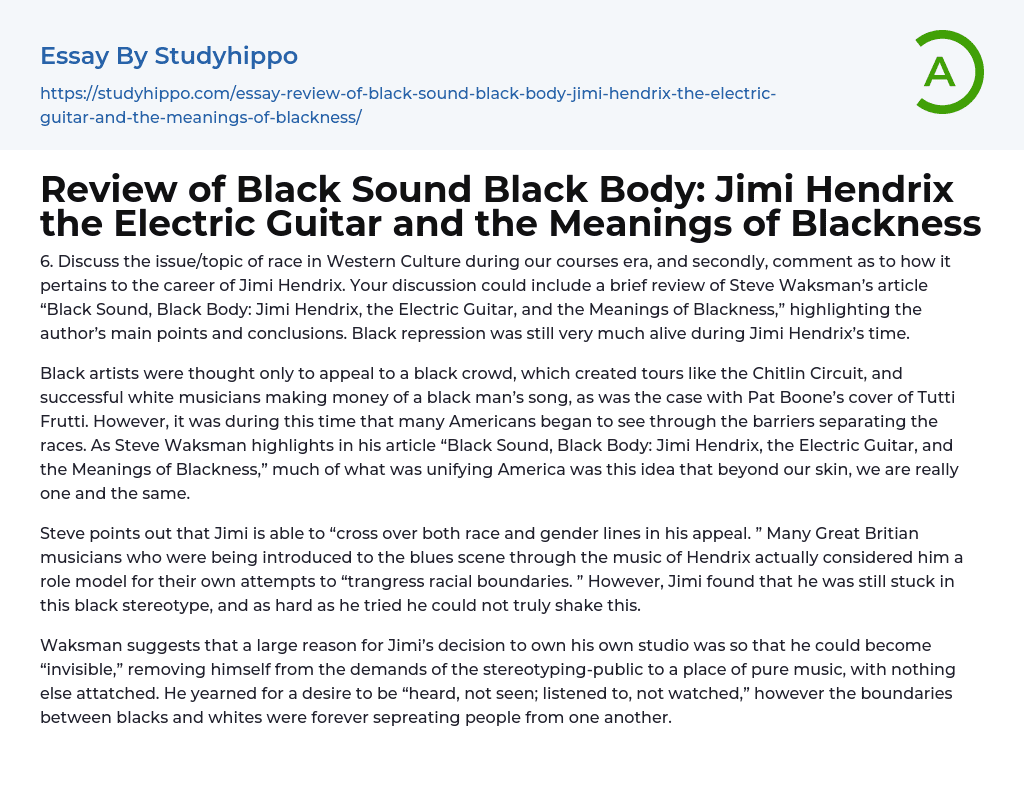6. Discuss the issue/topic of race in Western Culture during our courses era, and secondly, comment as to how it pertains to the career of Jimi Hendrix. Your discussion could include a brief review of Steve Waksman’s article “Black Sound, Black Body: Jimi Hendrix, the Electric Guitar, and the Meanings of Blackness,” highlighting the author’s main points and conclusions. Black repression was still very much alive during Jimi Hendrix’s time.
Black artists were thought only to appeal to a black crowd, which created tours like the Chitlin Circuit, and successful white musicians making money of a black man’s song, as was the case with Pat Boone’s cover of Tutti Frutti. However, it was during this time that many Americans began to see through the barriers separating the races. As Steve Waksman highlights in his articl
...e “Black Sound, Black Body: Jimi Hendrix, the Electric Guitar, and the Meanings of Blackness,” much of what was unifying America was this idea that beyond our skin, we are really one and the same.
Steve points out that Jimi is able to “cross over both race and gender lines in his appeal. ” Many Great Britian musicians who were being introduced to the blues scene through the music of Hendrix actually considered him a role model for their own attempts to “trangress racial boundaries. ” However, Jimi found that he was still stuck in this black stereotype, and as hard as he tried he could not truly shake this.
Waksman suggests that a large reason for Jimi’s decision to own his own studio was so that he could become “invisible,” removing himself from the demands of the stereotyping-public to a place of pure
music, with nothing else attatched. He yearned for a desire to be “heard, not seen; listened to, not watched,” however the boundaries between blacks and whites were forever sepreating people from one another.
- Sonnet essays
- Concert essays
- Piano essays
- Hip Hop essays
- Music Reference essays
- Musical Instruments essays
- Mp3 essays
- Recording essays
- Music video essays
- Singing essays
- Song essays
- Tupac shakur essays
- Classical Music essays
- Opera essays
- Rock Music essays
- Blues essays
- Jazz essays
- Sonata essays
- Baroque Music essays
- Rock And Roll essays
- Ludwig Van Beethoven essays
- Michael Jackson essays
- Popular music essays
- Band essays
- Classical Concert essays
- Music Concert Report essays
- Music Awards essays
- Walk This Way essays
- Song Analysis essays
- Atom essays
- Big Bang Theory essays
- Density essays
- Electricity essays
- Energy essays
- Force essays
- Heat essays
- Light essays
- Motion essays
- Nuclear Power essays
- Physiology essays
- Sound essays
- Speed essays
- Temperature essays
- Thermodynamics essays
- Actors essays
- Celebrity essays
- Magic essays
- Media essays
- Movies essays
- Music essays




